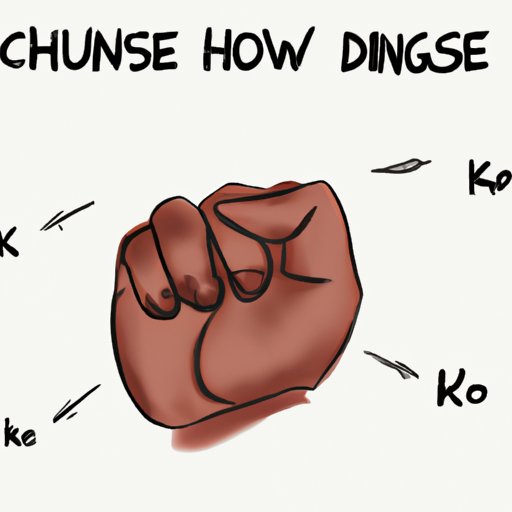
Introduction
Knuckles are an essential part of the hand and play a vital role in our everyday lives, from gripping objects to fist fights. Being able to draw knuckles correctly is an essential skill for artists, whether you’re drawing human hands or fictional creatures. In this article, we will explore different techniques for drawing knuckles, from realistic to stylized. We will also cover common mistakes made by beginners and provide actionable tips for avoiding them.
A Step-by-Step Tutorial
To begin drawing knuckles, it is crucial to understand the bone structure of the hand. Knuckles are formed by the joints between the phalanges (finger bones) and the metacarpal bones (hand bones). Here’s a step-by-step tutorial to help you draw knuckles:
- First, draw a basic sketch of the hand.
- Draw the basic shape of the knuckles by adding a bump on the back of the hand where each knuckle is located.
- Connect the bumps with curves to form the top part of each knuckle.
- Draw a straight line under the knuckles to form the bottom of the knuckles.
- Draw the folds of skin between each knuckle.
- Finally, add shading to your drawing to bring out the details.

Tips from Expert Artists
To get expert insights, we consulted with professional artists to provide actionable advice for beginners:
- Start by studying the bone structure of the hand.
- Practice drawing knuckles from different angles and lighting conditions.
- Use reference photos or real objects to study the details of knuckles.
- Don’t be afraid to experiment with different styles and techniques.
- Be patient and keep practicing. Drawing knuckles is a skill that takes time to develop.
Covering Common Mistakes
Beginners often make common mistakes when drawing knuckles. One mistake is not taking into account the bone structure of the hand. Another is not capturing the unique shape of knuckles accurately. Here are some tips to avoid these mistakes:
- Study the anatomy of the hand to understand the bone structure.
- Pay close attention to the shape of the knuckles and the folds of skin between them.
- Practice sketching knuckles from different angles and in various lighting conditions.
- Use reference photos or real objects to understand how knuckles look in real life.
Guide to Different Styles
Depending on the style and tone of your drawing, knuckles can be represented in various ways. Here are the three different styles in which knuckles can be drawn:
- Realistic: This style aims to achieve a lifelike representation of knuckles, capturing them with a high degree of accuracy.
- Cartoonish: This style exaggerates the shape and size of the knuckles for a more playful or whimsical look.
- Minimalist: This style simplifies the knuckles down to a few basic shapes and lines, creating a clean and straightforward representation.
Check out these tutorials for each style:
Focus on Anatomy
Knuckles have a unique shape that requires close attention to detail when drawing. Here are some tips to help you represent knuckle anatomy accurately:
- Study the bone structure of the hand to understand how knuckles are formed.
- Observe the angle and direction of the finger bones to understand how the knuckle bones fit together.
- Pay close attention to the wrinkle pattern on the back of the hand, which can help give your drawing depth and texture.
- Practice drawing knuckles from different angles and in various lighting conditions to improve your skills.
Practice Exercises
Now that you have some basic techniques and tips, here are some exercises to help improve your knuckle drawing skills:
- Draw the basic shape of a knuckle and try to represent it from different angles.
- Use reference photos or real objects and study the details of the knuckles, including the wrinkles and shadows.
- Draw a full hand with fingers and knuckles and try to represent the unique shape of each knuckle accurately.
- Experiment with different styles and techniques to find your own unique approach.
Conclusion
Drawing knuckles is a skill that takes time and practice to develop. Remember to study the anatomy of the hand, pay close attention to the shape and details of the knuckles, and experiment with different styles and techniques.





